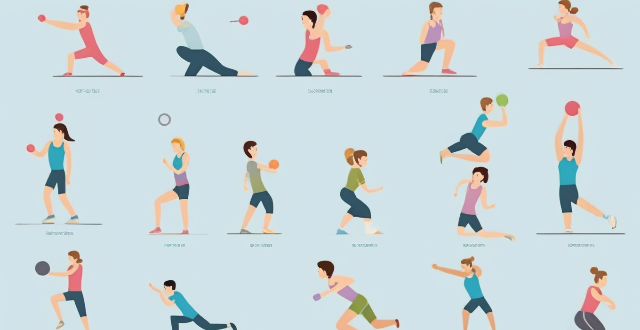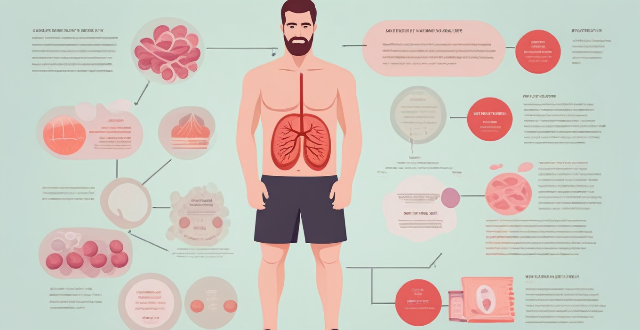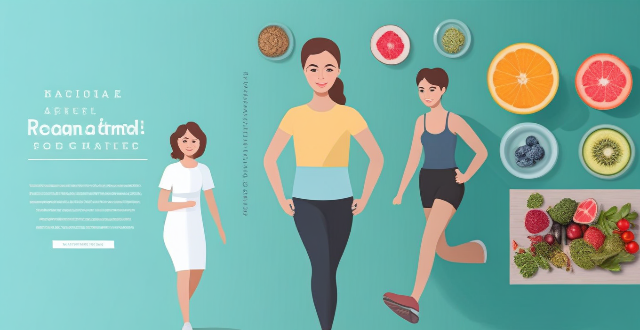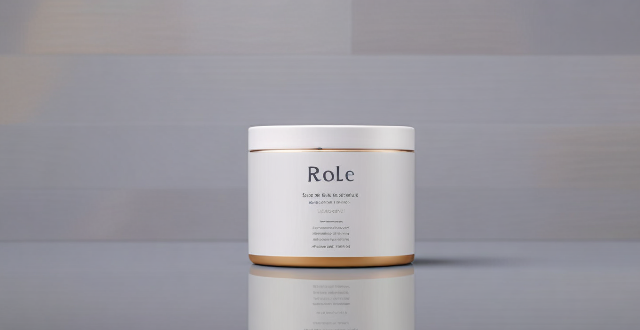Training Immune

Can excessive training have negative effects on the immune system ?
Excessive training, or overtraining, can have negative effects on the immune system. Regular exercise enhances immune function by stimulating antibody and white blood cell production, reducing inflammation, and improving circulation. However, excessive training can cause chronic inflammation, oxidative stress, and hormonal imbalances that suppress immune function. Signs of overtraining syndrome include chronic fatigue, mood changes, and increased susceptibility to illness. To prevent overtraining and maintain immune health, individuals should follow a balanced training program, prioritize sleep, eat a nutrient-rich diet, and manage stress levels.

Can exercise boost the immune system ?
Exercise can indeed boost the immune system through various mechanisms, including enhanced circulation, reduced inflammation, weight management, stress reduction, improved sleep, increased self-esteem and mental health, microbiome diversity, temperature regulation, prevention of chronic diseases, and social interaction. Regular moderate exercise is generally considered beneficial for the immune system, but it's essential to consult with healthcare professionals to determine the appropriate amount and intensity of exercise for individual needs and circumstances.

Is there a specific duration or intensity of exercise needed to improve immune function ?
The relationship between exercise and immune function is complex, but research suggests that regular physical activity can enhance the immune system. However, both the duration and intensity of exercise play significant roles in achieving this beneficial effect. The American Heart Association recommends at least 150 minutes of moderate-intensity aerobic activity or 75 minutes of vigorous-intensity activity per week for adults. Engaging in prolonged periods of endurance exercise can temporarily suppress immune function due to increased stress on the body. Light activities like walking or yoga can still offer immune benefits by reducing stress and promoting overall health. Regular moderate to high-intensity exercises, such as jogging, cycling, or strength training, are generally considered optimal for enhancing immune function. Adequate rest and recovery are crucial for maintaining a healthy immune system. Combining different types of exercises (aerobic, strength training, flexibility work) can provide a well-rounded approach to enhancing immune function. Staying hydrated and consuming a balanced diet rich in nutrients supports both exercise performance and immune health. Other lifestyle habits, including sleep quality, stress management, and avoidance of harmful substances, also play a vital role in supporting immune function alongside exercise.

How does consistent physical activity affect the immune system in relation to chronic disease prevention ?
The article discusses the impact of consistent physical activity on the immune system and its role in preventing chronic diseases. It explains that regular exercise can increase the number and activity of immune cells, reduce inflammation, and improve overall health. The article also provides recommendations for exercise and emphasizes the importance of incorporating physical activity into one's lifestyle to prevent chronic diseases and improve well-being.

Is it true that certain superfoods can boost your immune system ?
Incorporating superfoods like citrus fruits, garlic, ginger, spinach, yogurt, nuts and seeds, blueberries, and turmeric into your diet can help support immune health by providing key nutrients such as vitamin C, vitamin D, zinc, protein, and antioxidants. These foods offer a range of benefits including boosting white blood cell production, reducing inflammation, supporting digestive health, and protecting against oxidative stress. However, it's important to maintain a balanced diet and lifestyle for overall immune support.

Are there any particular sports or exercises that have been studied for their impact on immunity ?
This article discusses the impact of various sports and exercises on immunity, including aerobic exercise, resistance training, high-intensity interval training (HIIT), and yoga/meditation. It highlights the positive effects of these activities on immune function when performed regularly and appropriately, such as increased blood flow, enhanced immune cell production, improved cardiovascular health, and reduced inflammation. However, it also emphasizes the potential negative effects of excessive exercise or overtraining on immunity, urging individuals to find a balance between physical activity and rest.

How does regular exercise contribute to boosting the immune system ?
Regular exercise has numerous health benefits, including boosting the immune system. It promotes increased blood circulation, reduces inflammation, helps in weight management, reduces stress, improves sleep quality, enhances gut health, increases antioxidant capacity, supports cardiovascular health, enhances mental health, and contributes to increased longevity. Incorporating regular physical activity into your lifestyle can support a strong and resilient immune system.

How can I improve my diet to boost my immune system ?
Improving your diet is one of the best ways to boost your immune system. Here are some tips on how you can do that: ## Eat a Variety of Foods Eating a variety of foods ensures that you get all the essential nutrients your body needs. This includes fruits, vegetables, whole grains, lean proteins, and healthy fats. Aim for at least five servings of fruits and vegetables per day. ### Fruits and Vegetables - Apples - Bananas - Berries - Broccoli - Carrots - Spinach ### Whole Grains - Oats - Quinoa - Brown Rice ### Lean Proteins - Chicken breast - Fish (such as salmon or tuna) - Legumes (such as lentils or chickpeas) ### Healthy Fats - Avocados - Nuts (such as almonds or walnuts) - Seeds (such as chia or flaxseed) ## Stay Hydrated Drinking enough water is crucial for maintaining a healthy immune system. Aim for at least eight glasses of water per day, and more if you're active or it's hot outside. You can also stay hydrated by drinking herbal teas or eating water-rich foods like cucumbers, melons, and strawberries. ## Limit Processed Foods and Sugary Drinks Processed foods and sugary drinks can weaken your immune system by causing inflammation in your body. Try to limit these foods and drinks as much as possible, and opt for whole, nutrient-dense foods instead. ## Consider Taking Supplements If you're not getting enough vitamins and minerals from your diet, consider taking supplements. Some common supplements that may help boost your immune system include vitamin C, vitamin D, zinc, and probiotics. However, be sure to talk to your doctor before starting any new supplements.

How important is rest and recovery during a tennis training camp ?
The text discusses the significance of rest and recovery in a tennis training camp. It outlines six key reasons why taking time to rest and recover is crucial: preventing overuse injuries, enhancing performance, promoting muscle growth and repair, improving immune function, enhancing learning and adaptation, and maintaining motivation and enjoyment. Incorporating adequate rest periods into the training schedule can ensure that athletes stay healthy, perform better, and derive maximum benefit from the camp experience.

What types of physical activities are most effective in enhancing immunity ?
Regular physical activity is crucial for enhancing immunity, with various types of exercises offering specific benefits. Aerobic exercises like jogging, cycling, and swimming improve cardiovascular health, respiratory function, and overall fitness, while also reducing stress and inflammation. Resistance training, including weightlifting and yoga, builds muscle mass, promotes hormone balance, and supports gut health. High-Intensity Interval Training (HIIT) boosts metabolism and cardiovascular health. Incorporating a mix of these activities into your routine can significantly enhance immunity.

Does consistent exercise reduce the risk of catching colds and flu ?
Regular physical activity is known for its health benefits, including potential protection against colds and flu. Studies suggest that exercise can enhance immune system function by improving circulation and inducing a mild inflammatory response. However, the evidence is mixed, with some studies showing a clear link between regular exercise and reduced respiratory infections, while others do not. Potential mechanisms include improved immune surveillance, stress reduction, and increased circulation of immune cells. To benefit from these effects, it is recommended to engage in moderate to high levels of physical activity, such as 150 minutes of moderate aerobic activity or 75 minutes of vigorous activity per week, along with strength training exercises. Overtraining should be avoided, as it can weaken the immune system. Good hygiene practices are also essential for preventing colds and flu.

What are the benefits of including mental health and stress management in personal safety training programs ?
Incorporating mental health and stress management into personal safety training programs can improve physical health, enhance mental well-being, boost work performance, increase job satisfaction, and reduce costs for organizations. By managing stress levels, individuals can achieve better sleep quality, reduced anxiety and depression, increased resilience, improved relationships, and enhanced career development. Organizations can benefit from lower healthcare expenses and decreased turnover rates by promoting a positive work environment through mental health and stress management training.

Why is critical thinking training important ?
In today's complex world, critical thinking training is essential for effective problem-solving, communication, objectivity, creativity, and future preparedness. It enhances decision-making, collaboration, fairness, open-mindedness, and adaptability to changes. Investing in this training leads to success and positive impacts in various domains.

What role does nutrition play in a comprehensive sports training program ?
Nutrition is a crucial component of sports training, providingNutrition is a crucial component of sports training, providing repair, boosting immunity, providing energy, supporting recovery and repair, boosting immunity, and maintaining hydration. Athletes should consume a balanced diet with carbohydrates, proteins, and fats for optimal energy production. Pre-exercise meals should focus on carbohydrates, during-exercise snacks can include simple sugars for quick energy release, and post-exercise meals should combine carbohydrates and protein for recovery. Proper nutrition strategies can improve athletic performance and overall well-being.

What are the risks associated with excessive exercise and how can they be managed ?
Overtraining can lead to a range of health problems and injuries such as overuse injuries, cardiovascular problems, immune system suppression, reproductive system issues, and mental health issues. To manage these risks, athletes should prioritize proper rest and recovery, gradually progress their training, maintain good nutrition and hydration, get regular medical check-ups, be aware of their mental health, and listen to their body's signals. By implementing these strategies, athletes can minimize the risks associated with excessive exercise and maintain their physical and mental well-being.

Can vaccines be used to treat cancer or other non-infectious diseases ?
Vaccines are traditionally used to prevent infectious diseases by stimulating the immune system to recognize and attack specific pathogens. The possibility of using vaccines for the treatment of cancer or other non-infectious diseases is being explored, with a focus on modulating the immune response rather than stimulating it. Cancer vaccines, including preventive and therapeutic types, aim to stimulate the immune system to recognize and destroy tumor cells. For autoimmune diseases, researchers are exploring ways to use vaccines to dampen overactive immune responses or retrain the immune system. Vaccines are also being investigated for their potential in treating other chronic diseases such as Alzheimer's and heart disease. While promising, the application of vaccines in treating non-infectious diseases faces significant challenges, including identifying unique targets and balancing immune responses. Advancements in immunology and vaccine technology offer hope for new treatments that could benefit millions worldwide.

How long after starting a new exercise routine can improvements in immunity be expected ?
Regular exercise has numerous health benefits, including improved cardiovascular health, weight management, and mental well-being. One of the lesser-known benefits is its positive impact on the immune system. Improvements in immunity can be observed within a few weeks of starting a regular exercise program, depending on individual factors such as current fitness level, intensity and duration of exercise sessions, and overall lifestyle habits. By incorporating regular physical activity into your daily routine, you can enhance your immune function and enjoy the numerous other health benefits associated with exercise.

What are the best training methods for a marathon ?
The article provides a summary of the best training methods for a marathon, including long runs, interval training, hill training, tempo runs, cross-training, recovery weeks, race pace workouts, and tapering. It emphasizes the importance of consistency, patience, and listening to one's body during training.

What are the risks associated with overtraining in a sports program ?
Overtraining, or "overreaching," is a condition that arises when an athlete consistently trains beyond their body's capacity to recover. This can lead to various physical and psychological risks, including musculoskeletal injuries, immune system suppression, hormonal imbalances, decreased performance, cardiovascular stress, sleep disturbances, nutritional deficiencies, burnout syndrome, mood disorders, reduced motivation, and cognitive impairment. To prevent and manage these risks, athletes, coaches, and sports medicine professionals should implement regular recovery periods, ensure adequate nutrition and hydration, monitor training load, prioritize sleep quality and quantity, and seek professional help if signs of overtraining persist. It is crucial to be aware of the potential risks associated with overtraining to ensure long-term health and well-being in a sports program.

How do virus variants emerge ?
Virus variants emerge due to evolution, influenced byVirus variants emerge due to evolution, influenced bycombination, host immune influenced by factors like mutation, recombination, host immune response, and environmental factors. Mutations can make viruses more infectious or resistant to treatments, while recombination results in new viruses with characteristics from different parent viruses. The host's immune system drives the virus to mutate and develop new variants that can evade the immune response. Environmental factors like temperature and exposure to chemicals can also influence virus evolution. Understanding these mechanisms is crucial for preventing and controlling viral diseases.

How do I manage stress while training for a marathon ?
Managing stress is crucial during marathon training. Tips include setting realistic goals, following a structured plan, prioritizing recovery, staying hydrated and nourished, getting enough sleep, practicing mindfulness, seeking support, managing time wisely, and embracing the process. These strategies help minimize stress and make the training journey more enjoyable.

How often should I attend a tennis training camp to improve my game significantly ?
How often you should attend a tennis training camp to improve significantly depends on your current level and experience, goals, quality of training, personal commitments, physical recovery needs, and budget. Finding a balance that works for you is key to maximizing your chances of improvement.

How do online teacher training courses compare to traditional in-person workshops ?
This text compares online teacher training courses with traditional in-person workshops in terms of flexibility, interactivity, cost-effectiveness, personalization, networking opportunities, practice and application, technology requirements, certification, scalability, and updates. It concludes that both have unique advantages and limitations, and the choice often depends on individual preferences and the specific goals of the training.

How do I prevent injuries during marathon training ?
Preventing injuries during marathon training is crucial for a successful and enjoyable race. To reduce the risk of injury, runners should warm up and cool down properly, gradually increase training intensity, incorporate cross-training, wear proper footwear, stay hydrated and well-nourished, schedule rest days, listen to their bodies, engage in strength training and flexibility work, and prepare for race day with pacing strategies and course familiarization. By following these guidelines, runners can minimize the chances of getting injured and maximize their potential for success on race day.

Can strength training help with weight loss ?
Strength training, involving the use of resistance to induce muscular contraction and build strength, can significantly contribute to weight loss by increasing metabolic rate, boosting post-exercise oxygen consumption (EPOC), improving body composition, and enhancing appetite control. Incorporating strength training into your routine, starting slowly and focusing on compound movements while staying consistent, can help achieve weight loss goals.

How do I know if a tennis training camp offers quality coaching ?
When considering enrollment in a tennis training camp, it is crucial to assess the quality of coaching by examining credentials and experience of coaches, coach-to-player ratios, training methods and philosophy, reputation and reviews, facilities and support services, and personalized attention and feedback.

What role does nutrition play in sports career management ?
Nutrition is a critical component in managing a sports career, as it fuels performance, supports health, aids in weight management, and contributes to mental well-being. Athletes must focus on hydration, balancing macronutrients, ensuring micronutrient intake, timing meals appropriately, and judicious use of supplements. A personalized nutrition plan can optimize training, competition outcomes, and longevity in a sports career.

What is the balance between specialized training and cross-training for optimal sports performance ?
In the realm of sports performance, achieving a balance between specialized training and cross-training is crucial for athletes to reach their peak potential. Specialized training focuses on improving skills, techniques, and strategies specific to an athlete's chosen sport, while cross-training involves engaging in other forms of exercise or activities that complement and enhance overall fitness and athleticism. This article explores the importance of finding the right balance between these two approaches and how it can lead to optimal sports performance. Specialized training helps athletes develop sport-specific skills, fitness, and mental preparation, while cross-training promotes injury prevention, overall fitness, and mental health. Achieving the right balance depends on various factors such as an athlete's goals, age, experience level, and individual needs. Tips for finding the right balance include assessing goals, consulting with professionals, monitoring your body, incorporating variety, and staying motivated. By finding the right balance between specialized training and cross-training, athletes can optimize their sports performance while minimizing the risk of injury and maintaining overall health and well-being.

What is critical thinking training ?
This article provides an in-depth analysis of critical thinking training, explaining what it is and why it's important. It lists several benefits of critical thinking, such as enhanced problem-solving skills, improved decision making, boosted communication abilities, and increased adaptability. The article also offers strategies for developing critical thinking skills, such as asking questions, challenging assumptions, considering multiple perspectives, evaluating evidence, avoiding bias, practicing reflective thinking, learning from mistakes, engaging in dialogue, reading widely, and seeking feedback. Overall, the article emphasizes the importance of critical thinking training for personal and professional development.